By Jason Kunzman
“God created man because God loves stories.”
— Elie Wiesel
As our solidarity delegation of 13 leaders from the JCC Movement made our way through Israel during a six-day visit, we asked those we met with—family members of those taken hostage, government officials, community organizers, leaders of non-governmental organizations, journalists, and marketing experts—what we could do for them and the State of Israel when we returned to our respective communities. The answer each time was simple and consistent: “Tell the story of what you have just experienced.” My time on the ground in Israel has left me with a lifetime’s worth of emotion and countless stories of devastation, innovation, and inspiration. In many ways, there are no words, and in other ways, there are not enough words. What I experienced has become a part of my identity, not just as a Jew and community leader but as a human being.
Devastation
An intelligence officer we met with in Yad Binyamin explained that Hamas was all too familiar with Israel’s pain point related to hostages, as was demonstrated in 2011 when Israel exchanged more than 1,000 Palestinian prisoners for a single IDF soldier, Gilad Shalit. Several of those Palestinian prisoners released 12 years ago were part of the leadership team of terrorists that developed the plan for October 7, which included taking as many captives as they could grab. The issue, though, was that the Hamas terrorists never could have predicted how successful they would be in executing their attack, and at some point, their commanders communicated a switch from taking prisoners to simply killing as many Israelis as possible.
The same intelligence officer told us that if not for the brutality in the way the terrorists executed their plan, the death toll would have been much worse, and with the slow response of the IDF, the terrorists could have made their way toward Tel Aviv. Can you imagine? The only thing that saved lives was the savagery with which the terrorists killed their victims and the time it took to carry out perhaps the most heinous acts against humanity the world has ever seen. At Kfar Azza we bore witness to the unimaginable horror committed by the terrorists and their complete disregard for human life. While walking through the rubble of this once-thriving kibbutz of 900 residents, we came upon the door to a safe room that had been decorated with Disney princesses. As the terrorists entered this home, they used a rocket-propelled grenade to blow off the handle of the door and proceeded to kill everyone in the safe room. How is it possible for such sweet innocence to meet with such butchery?
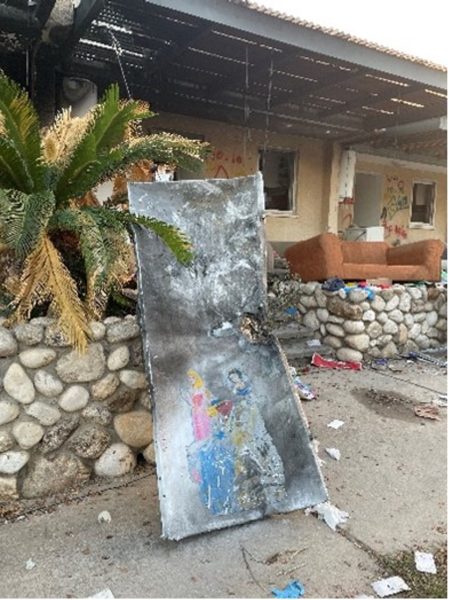
We also saw the sad and tragic irony of an agalul | a type of crib on wheels. Typically found on every kibbutz in Israel, those we saw now carry shell casings instead of the babies and toddlers they are meant to move safely throughout the community.
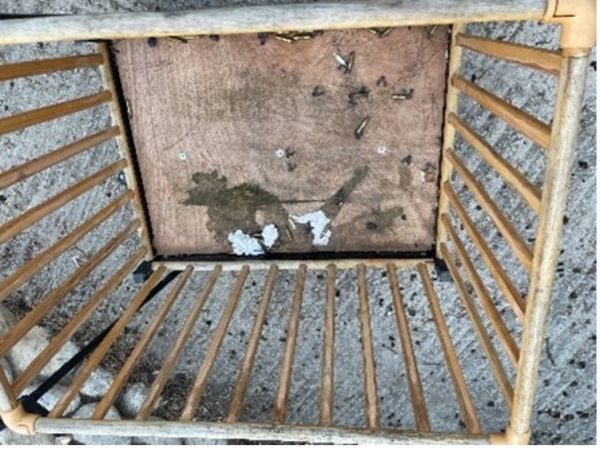
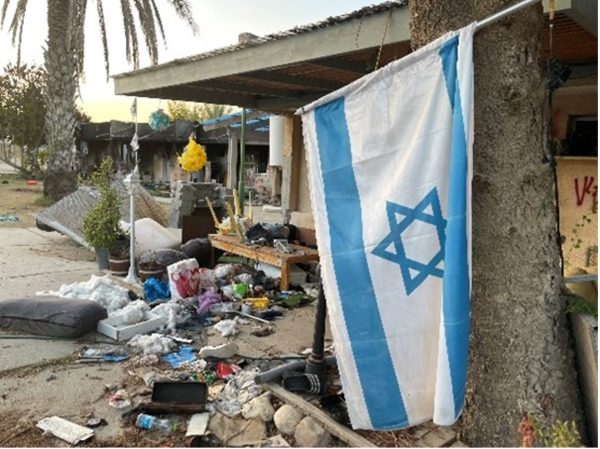
The indiscriminate and senseless killing was magnified as we learned about the murder of Ofir Liebstein, head of the Sha’ar HaNegev Regional Council, that had developed plans for an industrial zone to employ both Israelis and Palestinians from Gaza. It was incomprehensible to us that someone so dedicated to peace and coexistence with his neighbors could be gunned down just feet from his home by people from the same area he was so committed to helping.

Our travels also took us to Sderot, a city of approximately 36,000 residents located just one kilometer from the Gaza Strip border and no stranger to being the target of rocket attacks and incursions over the last several years. We immediately made our way to where the local police station once stood but was razed to the ground as a means of ensuring that any remaining terrorists inside were killed.
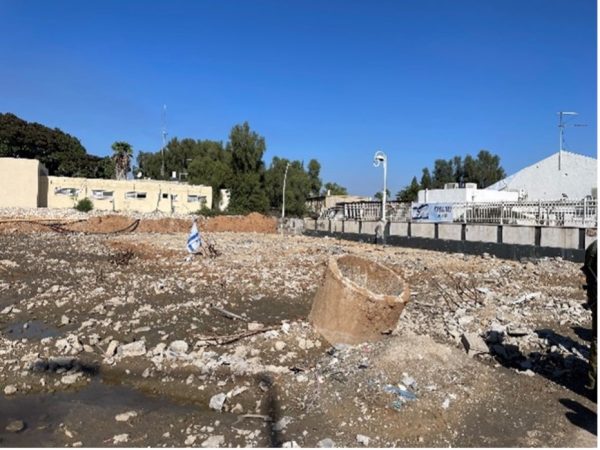
We also met Ronen, head of the city’s security who rescued two little girls, ages 4 and 6, from the back seat of their car after their parents were shot dead. As Ronen approached the girls, they asked him, “Are you Israeli?” These poor girls, now orphans, will forever have the image of their parents’ killers seared in their minds, and who knows the trauma they may associate with the simple act of riding in a car.
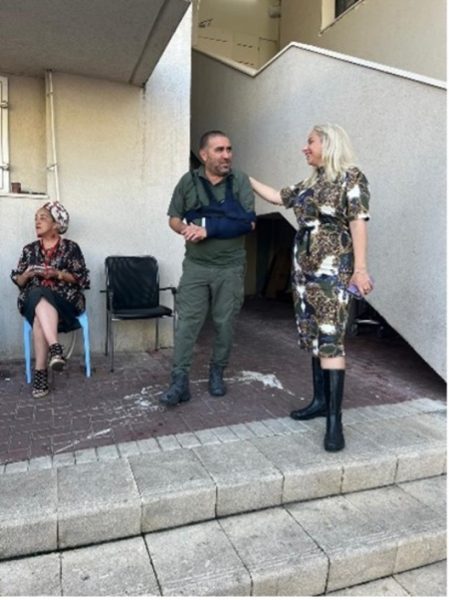 Innovation
Innovation
Despite being at war with Hamas and the possibility that the war will expand with Hezbollah to the north, Israel’s imagination and creativity, which are part of the reason it is known as “the start-up nation,” have come through loud and clear. For example, the country has seen a significant increase in the number of Haredi men who have registered to fight with the IDF. Exempt from military service, an estimated 2,000 have volunteered for IDF service. In the past, Haredi rabbis have insisted that fervent prayer for Israel’s safety and security is just as important as military service, but this group of more moderate Haredi volunteers has decided to go against the wishes of many of their leaders.
We visited the Sagol Center for Hyperbaric Medicine and Research at the Shamir Medical Center where ground-breaking work is being done to treat post-traumatic stress disorder (PTSD). Professor Shai Efrati and Dr. Keren Doenyas-Barak have determined that PTSD is a physiological rather than a psychological disorder in which a brain injury doesn’t allow patients to encode their traumatic event as having occurred in the past. The increase and decrease of oxygen levels in the hyperbaric chamber trick the body into thinking there is a lack of oxygen available and in response, the body reproduces stem cells, blood vessels, and nerves. In the initial days following October 7, Efrati and Doenyas-Barak and their team have been able to scale the operation to serve 300 patients each day. Given the level of projected trauma in the aftermath of the Hamas attacks, they are now in a race against time—actively seeking $8.5 million in funding so they can increase the number of patients served to 800 per day.
We also learned about Ariel Blum, an Israeli entrepreneur who is hellbent on demonstrating the resilience of the nation’s tech sector and its potential growth following the war. Blum has put out a challenge to his fellow entrepreneurs for one new start-up to be created for every Israeli life lost to the war. In issuing the challenge, Blum said, “To me, that’s the beauty in Israeli thinking and values. Each person is a world, and we need to rebuild these worlds.” What an incredible expression of Jewish tradition that aspires to honor the memories of those who have passed to be forever a blessing.
Inspiration
Throughout our travels, moments of hope and optimism came from expected and unexpected places. In our conversation with Hillel Fuld, a tech marketing genius who has dedicated his efforts to spreading positivity and fighting disinformation via social media, he pointed out that the Israeli population has increased by nearly 3% since October 7, a clear indication of how Hamas and the Palestinian Islamic Jihad significantly underestimated the resolve of the Jewish people and their commitment to Israel. And what about the 200,000 evacuees from the 22 communities most directly affected by the atrocities of October 7? Five hundred from Sderot were staying at our hotel in Jerusalem, and another 800, primarily from Ashkelon, were staying on the 22-acre grounds of the Maccabiah World Union (MWU) in Ramat Gan.
More than 200 of these makeshift communities have been set up throughout the country, each fueled by an army of volunteers who help ensure the needs of their guests are being met every day. With funding from the Federation system, MWU has partnered with GLOW Glamping to launch a national project for PTSD victims from the October 7 Supernova music festival near Kibbutz Re’im. The program, which takes place in a secluded part of the MWU campus, includes four days of trauma services, and the goal is to host cohorts of up to 50 people each week for the next 10 weeks.
And then there was the employee health physician from Hadassah Hospital who showed up with her medical bag at the Dan Panorama Hotel in Jerusalem when she heard the hotel was going to be housing evacuees. Assuming that there would be a great need for medical attention among the group, the physician was surprised to learn that what they needed most was a laundry service. She now comes to the hotel three times each week to collect evacuees’ dirty clothing and take it home to be washed. We also were privileged to meet Yonatan, a 24-year-old IDF paratrooper who was shot in the leg on October 7. While recovering from his wounds, he is training recruits for his combat unit until he can return to the front. In our discussion with Yonatan, he shared his hopes for a post-war Israel with extraordinary wisdom and insight:
For the last several years, we have taken Eretz Yisrael for granted. Now there will be a generation who has put their lives on the line and who will help lead us to the next level and no longer take our beloved country for granted.”
It is hard to believe that when I last traveled to Israel in May, the country was engaged in a deep civic debate about its democratic character. Fast forward five months and the country now finds itself fighting for its very survival. October 7 will forever be an indelible moment in world history. But as Jews, we do more than record an accounting of events in time. We treasure and preserve memories—stories of the past internalized and incorporated into who we are. Stories are often referred to as the lifeblood of the Jewish people and we rely upon them to preserve great success and grave catastrophe and shine a light on the possibilities of a new reality. As we enjoy the company of loved ones for Thanksgiving and Shabbat, may these stories of devastation, innovation, and inspiration demonstrate the strength and resolve of the State of Israel, and may we all be moved to work together to create a stronger and more resilient future for generations to come.

Jason Kunzman is president and CEO of the JCC of Greater Pittsburgh in Pennsylvania. He participated in the JCC Executive Solidarity Mission to Israel in November 2023, and this essay originally appeared on JCC State of Mind.
This blog post is one in a series authored by JCC CEOs and executive directors who recently visited Israel on one of two different JCC Movement Solidarity Missions. Read other posts in the series.
Reader Interactions